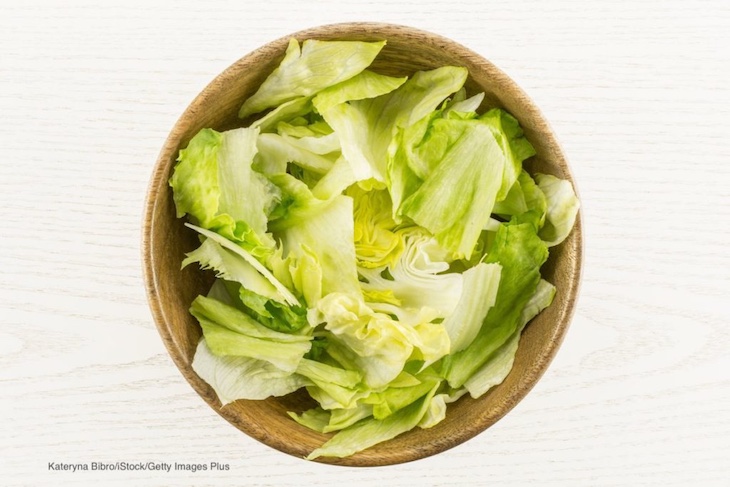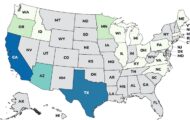Consumer Reports finds Listeria monocytogenes bacteria in both bulk and bagged prewashed lettuce. This disturbing discovery highlights the fact that leafy greens have been the source of many serious multistate food poisoning outbreaks in the last few years.

Researchers at the company purchased 284 samples of fresh greens at several grocery store chains, including Hannaford, Whole Foods, and Costco. The samples included lettuce, spinach, and kale. The company found six leafy greens samples that were tainted with Listeria monocytogenes.
Two specific products that tested positive for the pathogen were packaged, prewashed greens made of spinach, and an organic spinach-spring mix. The remaining four products were loose heads or bunches of green kale, green leaf lettuce, spinach, and red leaf lettuce. All of the greens were purchased between June 3 and 19, 2019 in Connecticut, New Jersey, and New York.
Consumer Reports does say that this study is a “snapshot” of the market and isn’t large enough, statistically speaking, to draw any conclusions about the safety of leafy green brands or the retailers that carry those brands. But this test does point out that industry needs to do more to improve the safety of these products.
History of Leafy Greens Outbreaks
The history of food poisoning outbreaks linked to leafy greens is long. A 2014 CDC study found that produce caused the most outbreaks from 1998 to 2008 and leafy greens were the culprit in half of those outbreaks.
Produce was linked to 30 to 6o outbreaks a year between 1998 and 2016. In 2016, a Listeria monocytogenes outbreak linked to Dole leafy greens sickened 33 people in the U.S. and Canada. And in late 2018, an E. coli outbreak linked to romaine lettuce sickened at least 62 people in 16 states.
What Did Consumer Reports Find?
Of the six leafy greens samples that contained Listeria monocytogenes, one had a strain that was genetically linked to at least two cases of listeriosis the CDC knows about, although whether those people ate leafy greens before their illness is unknown. That product was a “triple-washed” Nature’s Place Organic Spinach Spring Mix purchased at Hannaford. Hannaford did not receive any illness reports associated with that product.
The other products that tested positive for Listeria monocytogenes were unbranded, bagged red leaf lettuce purchased at Acme, bagged “triple washed” Boskovich Farms brand spinach purchased at Costco, unbranded, unbagged spinach purchased at Hannaford, and unbagged Lancaster Farm green kale and unbranded, unbagged green leaf lettuce from Whole Foods.
Consumer Reports notified the FDA and CDC about their test results, and contacted the companies that marketed the greens and retailers that sold them. The FDA inspected the plant that produced the Nature’s Place Organic Spinach Spring Mix purchased at Hannaford. While Hannaford told Consumer Reports that the FDA had “not found anything of concern in its inspection,” the FDA has not yet responded.
When contacted by Consumer Reports, Hannaford conducted an additional deep clean of the display case where the bulk spinach was purchased. Boskovich Farms said they had not received any illness reports, and that inspections showed no contamination. The other retailers said that consumers should wash unbagged leafy greens.
Who Gets Sick?
While most healthy people won’t get seriously ill if they do eat something contaminated with Listeria monocytogenes, there are several groups that are really hit hard. Pregnant women can suffer miscarriages and stillbirth. The elderly, children, and people with compromised immune systems or chronic illnesses can become seriously ill.
Dr. James E. Rogers, director of food safety research and testing at Consumer Reports, said that those groups should consider carefully whether to eat raw leafy greens at all. In fact, he said, “The safest thing is to stick with greens you can cook.”
How To Protect Yourself
“Wash your greens,” is what all the experts and the leafy green industry says. Unfortunately, washing leafy greens will not remove all pathogens. Studies have shown that washing these foods will not remove all E. coli bacteria. And Dr. Rogers adds that “washing is mainly helpful for getting rid of dirt and some pesticides, not bacteria. Bacteria can adhere to the surface of the leaves, and get stuck in microscopic crevices.”
So how can you protect yourself? There are no guarantees. But there are some things you can do. First, choose prewashed bagged leafy greens and buy a bag with an expiration date as far into the future as possible. Don’t rinse them at home because you may re-contaminate them. If you purchase unbagged greens, wash thoroughly under cool running water. Dry the greens using a paper towel. Eat all fresh leafy greens as soon as possible and always store them in the fridge.
But if you are in a high risk group, you may want to stick to leafy greens that you can cook. Also, avoid eating raw greens at restaurants. Most outbreaks linked to greens were associated with restaurants, according to a CDC study. And stay aware of recall and outbreak notices that will alert you to problems.




